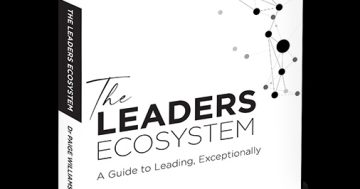Mark Travers* says new psychological research has uncovered the four traits that great leaders exhibit.
 New studies in psychology help us understand what it takes to be a great leader.
New studies in psychology help us understand what it takes to be a great leader.
Leadership is a valued trait in the workplace; companies invest heavily to identify, cultivate, and retain their key people.
But what does it take to be a good leader? New psychological research has an answer.
According to recent studies, great leaders tend to exhibit the following four traits: people-centrism, purpose-centrism, learning-centrism, and versatility.
Here is a summary of these characteristics as well as some ideas on how you can make mindset shifts to apply them to improve your own leadership abilities.
People-centrism, purpose-centrism, and learning-centrism leadership.
A recent study published in the Journal of Entrepreneurship investigated the mindsets of successful entrepreneurial leaders.
The researchers found three themes in common: successful leaders exhibit people-oriented, purpose-oriented, and learning-oriented mindsets.
- A people-oriented mindset, according to the researchers, encourages inclusiveness, openness, positivity, and appreciation.
Leaders who exhibit a people-oriented mindset tend to think and act in the interest of everyone.
They are open to the views and opinions of all stakeholders and they stay positive in the face of adversity.
They also show appreciation for the contribution of all team members.
- A purpose-oriented leader exhibits a steadfast focus on a purpose or intention.
Purpose-oriented leaders are successful in defining the overarching mission, aligning stakeholders with that mission, and staying true to the mission in the face of short-term road bumps.
Purpose-oriented leaders are good at keeping things in perspective and they have a knack for practicing patience with stakeholders.
- A learning-oriented leader describes someone who picks up signals from all around and is unafraid to experiment or take risks.
This type of leader listens to all sources, uses technology to discover and organise insights, ensures that everyone is heard, tries out new ideas and experiments, and prods for improvement in all areas.
How do these leadership styles translate into effective job performance? The researchers offer a few examples.
For instance, people-oriented leaders tend to stick with their employees and teams even when the going gets tough.
Instead of disbanding fledgling operational units, people-oriented leaders work to identify pain points and try to increase the confidence of disgruntled employees.
They abide by the philosophy, “the best employees are the ones you already have.”
Purpose-oriented leaders don’t allow short-term logistical hurdles to prevent them from achieving their mission.
One example given by the researchers tells the story of a leader who successfully brought rare-condition health treatments to rural parts of India despite significant logistical hurdles.
Learning-oriented leaders aren’t afraid to go against the grain and even make short-term mistakes in pursuit of achieving their long-term objectives.
The researchers return to the example of bringing rare-condition health treatments to remote areas of India.
They state, “[The] idea of taking the equipment in a vehicle to rural parts of India was met with skepticism with more than 40 funding agencies rejecting the proposal.
“But persistence in experimenting with it, working along with the equipment manufacturer, making mindset shifts, and making it happen is an example of the leader practicing both experimentation and risk-taking.”
Versatility is an important leadership trait, especially during times of uncertainty.
A recent study published in the journal Consulting Psychology argues that another part of successful leadership has to do with the leadership style one chooses to invoke to match a given situation — such as how one chooses to navigate the Covid-19 crisis.
The scientists found that leaders who adopted a “versatile” leadership style — characterised by a flexible combination of forceful, enabling, strategic, and operational leadership — were viewed as more effective at managing teams during the pandemic.
“The main conclusion,” say the researchers, “is that versatile leadership, consisting of a wide repertoire of complementary skills and behaviours appropriately applied to changing circumstances, is important for helping teams to adapt to unexpected change and continue to produce, especially in times of crisis and, by implication, perhaps in recovery and adjusting to the post-pandemic world.”
Versatility, according to the researchers, is best expressed when managers use (but don’t overuse) the following four managerial styles:
1. Forceful Leadership.
Forceful leadership entails asserting personal and positional power.
Forceful leadership is characterised by a take charge, decisive, and demanding leadership attitude.
2. Enabling Leadership.
Enabling leadership requires leaders to involve and empower others, to be open to employee input, and to provide regular help and encouragement.
3. Strategic Leadership.
Strategic leadership is a management style that seeks to position the organisation for long-term success.
It is characterised by course-setting, growing the organisation, and encouraging innovative thinking.
4. Operational Leadership.
Operational leadership refers to day-to-day execution.
It involves concentrating resources, keeping people focused on tasks and workflows, and using process discipline.
The researchers found that managers who expressed versatility in their leadership style were generally more effective than managers who exhibited only one or two of the leadership dimensions described above.
And, this was especially true for managers who were leading teams during the pandemic.
Leaders blend many strengths
Leaders must possess a variety of psychological strengths to be effective in their roles.
They must understand their people.
They must have a long-term vision.
They must not be afraid to make mindset shifts to try new things.
And, perhaps most of all, they must not take a one-size-fits-all approach to management.
*Mark Travers, Ph.D., is an American psychologist with degrees from Cornell University and the University of Colorado Boulder. He can be reached at [email protected].
This article first appeared at ivyexec.com.











